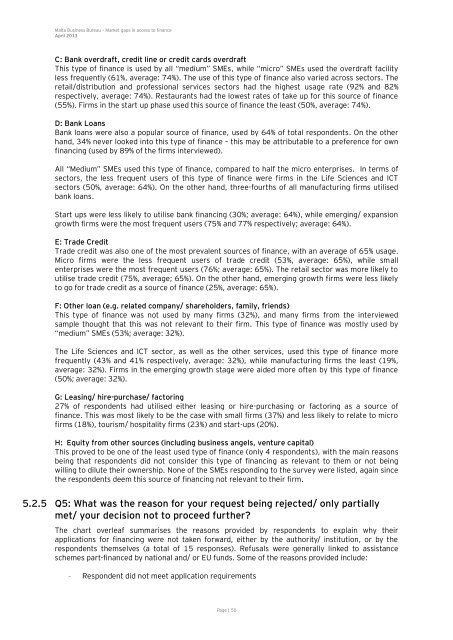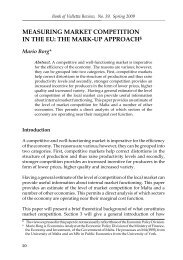Market Gaps on Access to Finance - Bank of Valletta
Market Gaps on Access to Finance - Bank of Valletta
Market Gaps on Access to Finance - Bank of Valletta
You also want an ePaper? Increase the reach of your titles
YUMPU automatically turns print PDFs into web optimized ePapers that Google loves.
Malta Business Bureau – <str<strong>on</strong>g>Market</str<strong>on</strong>g> gaps in access <strong>to</strong> finance<br />
April 2013<br />
C: <strong>Bank</strong> overdraft, credit line or credit cards overdraft<br />
This type <strong>of</strong> finance is used by all “medium” SMEs, while “micro” SMEs used the overdraft facility<br />
less frequently (61%, average: 74%). The use <strong>of</strong> this type <strong>of</strong> finance also varied across sec<strong>to</strong>rs. The<br />
retail/distributi<strong>on</strong> and pr<strong>of</strong>essi<strong>on</strong>al services sec<strong>to</strong>rs had the highest usage rate (92% and 82%<br />
respectively, average: 74%). Restaurants had the lowest rates <strong>of</strong> take up for this source <strong>of</strong> finance<br />
(55%). Firms in the start up phase used this source <strong>of</strong> finance the least (50%, average: 74%).<br />
D: <strong>Bank</strong> Loans<br />
<strong>Bank</strong> loans were also a popular source <strong>of</strong> finance, used by 64% <strong>of</strong> <strong>to</strong>tal resp<strong>on</strong>dents. On the other<br />
hand, 34% never looked in<strong>to</strong> this type <strong>of</strong> finance – this may be attributable <strong>to</strong> a preference for own<br />
financing (used by 89% <strong>of</strong> the firms interviewed).<br />
All “Medium” SMEs used this type <strong>of</strong> finance, compared <strong>to</strong> half the micro enterprises. In terms <strong>of</strong><br />
sec<strong>to</strong>rs, the less frequent users <strong>of</strong> this type <strong>of</strong> finance were firms in the Life Sciences and ICT<br />
sec<strong>to</strong>rs (50%, average: 64%). On the other hand, three-fourths <strong>of</strong> all manufacturing firms utilised<br />
bank loans.<br />
Start ups were less likely <strong>to</strong> utilise bank financing (30%; average: 64%), while emerging/ expansi<strong>on</strong><br />
growth firms were the most frequent users (75% and 77% respectively; average: 64%).<br />
E: Trade Credit<br />
Trade credit was also <strong>on</strong>e <strong>of</strong> the most prevalent sources <strong>of</strong> finance, with an average <strong>of</strong> 65% usage.<br />
Micro firms were the less frequent users <strong>of</strong> trade credit (53%, average: 65%), while small<br />
enterprises were the most frequent users (76%; average: 65%). The retail sec<strong>to</strong>r was more likely <strong>to</strong><br />
utilise trade credit (75%, average; 65%). On the other hand, emerging growth firms were less likely<br />
<strong>to</strong> go for trade credit as a source <strong>of</strong> finance (25%, average: 65%).<br />
F: Other loan (e.g. related company/ shareholders, family, friends)<br />
This type <strong>of</strong> finance was not used by many firms (32%), and many firms from the interviewed<br />
sample thought that this was not relevant <strong>to</strong> their firm. This type <strong>of</strong> finance was mostly used by<br />
“medium” SMEs (53%; average: 32%).<br />
The Life Sciences and ICT sec<strong>to</strong>r, as well as the other services, used this type <strong>of</strong> finance more<br />
frequently (43% and 41% respectively, average: 32%), while manufacturing firms the least (19%,<br />
average: 32%). Firms in the emerging growth stage were aided more <strong>of</strong>ten by this type <strong>of</strong> finance<br />
(50%; average: 32%).<br />
G: Leasing/ hire-purchase/ fac<strong>to</strong>ring<br />
27% <strong>of</strong> resp<strong>on</strong>dents had utilised either leasing or hire-purchasing or fac<strong>to</strong>ring as a source <strong>of</strong><br />
finance. This was most likely <strong>to</strong> be the case with small firms (37%) and less likely <strong>to</strong> relate <strong>to</strong> micro<br />
firms (18%), <strong>to</strong>urism/ hospitality firms (23%) and start-ups (20%).<br />
H: Equity from other sources (including business angels, venture capital)<br />
This proved <strong>to</strong> be <strong>on</strong>e <strong>of</strong> the least used type <strong>of</strong> finance (<strong>on</strong>ly 4 resp<strong>on</strong>dents), with the main reas<strong>on</strong>s<br />
being that resp<strong>on</strong>dents did not c<strong>on</strong>sider this type <strong>of</strong> financing as relevant <strong>to</strong> them or not being<br />
willing <strong>to</strong> dilute their ownership. N<strong>on</strong>e <strong>of</strong> the SMEs resp<strong>on</strong>ding <strong>to</strong> the survey were listed, again since<br />
the resp<strong>on</strong>dents deem this source <strong>of</strong> financing not relevant <strong>to</strong> their firm.<br />
5.2.5 Q5: What was the reas<strong>on</strong> for your request being rejected/ <strong>on</strong>ly partially<br />
met/ your decisi<strong>on</strong> not <strong>to</strong> proceed further?<br />
The chart overleaf summarises the reas<strong>on</strong>s provided by resp<strong>on</strong>dents <strong>to</strong> explain why their<br />
applicati<strong>on</strong>s for financing were not taken forward, either by the authority/ instituti<strong>on</strong>, or by the<br />
resp<strong>on</strong>dents themselves (a <strong>to</strong>tal <strong>of</strong> 15 resp<strong>on</strong>ses). Refusals were generally linked <strong>to</strong> assistance<br />
schemes part-financed by nati<strong>on</strong>al and/ or EU funds. Some <strong>of</strong> the reas<strong>on</strong>s provided include:<br />
– Resp<strong>on</strong>dent did not meet applicati<strong>on</strong> requirements<br />
Page | 50







